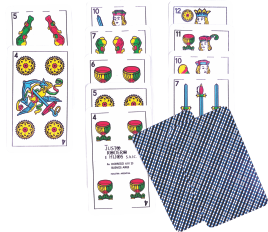
General rules
Name derived from “tutti”, all, in Italian, because in theis game the one who manages to gather all the kings or all the horses, wins the game. But this is an excepcional case.Normally it´s played with a pack of 40 cards .between two, three or four people, teamed two and two. Each player must have 6 cards, distributed once or twice, and must obtain a new card alter each throw doubled, and is obligatory for the one who won the last throw to take it first. Having each one six cards the first time, the lowest is turned over, which marks the winner of the game. The aces are worth 11 points; the threes, 10; kings, four; queens, three; jacks, two The rest of the cards are void and with no value at all.
When you have 4 kings or queens, both by hand or stealing a card, the “tute” is made, this is “accused” and the game is won.
When a king and a queen of the same suit are gathered, “acusan veinte”, expresing the corresponding suit, but if the king and the queen are triumphs, they are worth 40, and then “acusan las cuarenta”.
The game is won doing a “tute” of more than 100 points, adding the values the cards of the tricks, together with the challenges, if there were. If you have a “tute” of hand, the game is won without playing; if it is done during the game, it cannot be announced before winning one trick.
The one that does the last throw acuses 10 points, and adds them when counting his tricks.
When doing the account, if nobody has 100 points, cards are dealt again and the game continues, maintaining the previous account, until one of the opponents has 101 points, whether with” acuses” or with ordinary tricks.
Tute de arrastre o arrastrado
It is played between three or also four people. In the first case, 13 cards are distributed, in the second, 10 .
Having distributed 13 cards to each one, the last one marks the triumph and remains on the table, it it is higher than the 7, it must be changed by a 7, and this one by a 2.
The inicial move will be done by the hand, who is placed to the right of the dealer, following the order on the right
It is obligatory to asist the suite of the card shown by the hand, and also go winning. If there is no higher, lower can be served.
If the hand plays a card of a suite the player has not got, he will serve triumph, being the third, if he has the same suit, able to serve lower.
Having the hand played, if the second and the third don´t have for serving, or have no triumph, they will serve of another suite.
If opening the hand, the second one has none of the same suite and serves a triumph, and the third has not the suite or higher triumph, he will be able to serve what suits him best. To declare 20 or 40 it´s necesary to do a trick , not been able to declare more than one each time and first the 40´s. Also, whoever does the last trick , wins ten points.
The game is won by the player that makes more points.
If 2 or more players pass the mark of 101 points, whoever does the last 10 wins and the other two will loose.
There are also games that are played declaring “voy al plato”, and if he does not do the points declared or more, he will loose the same quantity than the “plato”, that is, double.
The one who does the points declared on opening wins. If more than one declares “voy al plato”, the one that says more will be prefered, the other two will go against.
It can also be played with a cup, the one who deals puts in one point and the one who passes the mark of 101 points wins the contents.
Tute de remate o subastado
In the “Tute de remate o subastado” the same general rules of the “tute arrastrado” and the distribution is similar to the former. This tipe of “tute” consists in that after dealing the cards, an auction is verified between the players, to determine who will play. The other players go against, trying to stop the player from doing the promised points.
The triumph is marked by the one who plays, alter winning the auction, and therefore it is not marked when dealing the cards like in the former game.
For the cards to be divided by three, the twelves are withdrawn from the pack, being then reduced to 36 cards and dealing 12 cards to each player.
Once these cards are dealt, the auction takes place in the following way: The hand talks first and declares the points he will do, calculating that the triumph be of the suit more favorable to him, but he won´t say it until the auction has taken place. He will say, for instance, “sixty points”.
He won´t be able to do less than 50, andi f he doesn´t even reach this sum, he will say “Paso”.
Then the following player talks, if he at least can´t do 5 points more than the previous, he will say “Paso”. If he can, or more quantity, he will say “70, 80, or 90” (whatever).
The last player talks in the same way.
Generally, only one auction is allowed; that is, alter the third player talks, the rest can´t continue doing so. But in some games, the auction continues, the first player continues talking and so on until the end of the auction.
The fourth player, that has dealt the cards and doesn´t play, once verified the auction, takes the cards of the one who has auctioned more, and has the right to play with them instead of the other one; if he takes the compromise of doing 10 points more than those ofered by him, but in this case, if he does so, he will collect double from each player, and if he doesn´t, he will pay double to each one.
When the auction finishes, the one who plays will declare the triumph, which he can choose as he wants.
The game takes place as in the standard “tute”, and the objective followed by those who don´t play is to avoid that the one playing does the promised points. But if he does, he will collect from each one, including the dealer, a number of points equal to those promised, with no influence of whether he surpassed the quantity a bit or a lot.If he fails, he will pay the exact number of points to each one of the others according to what he promised and didn´t.
The rest of the rules of the game, the way of declaring the 20´s and the 40´s and doing the 10´s in the end, etc., are similar to those of the “tute arrastrado”.
When a player takes the compromise of doing 120 points, if he does, he collects double, that is, 240 points from each player, and if he doesn´t, he will also pay double to each player.
